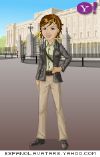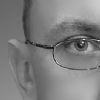|
ESL Forum:
Techniques and methods
in Language Teaching
Games, activities
and teaching ideas
Grammar and
Linguistics
Teaching material
Concerning
worksheets
Concerning
powerpoints
Concerning online
exercises
Make suggestions,
report errors
Ask for help
Message board
|
ESL forum >
Message board > parts of speech
parts of speech
|

kasiopeja01

|
parts of speech
|
hello,
please can someone help me? If you have a sentence such as Children are dressed.
children - noun
are - verd
dressed - adjective?
or should I analyse are dressed as one?
And how about phrasal verbs such as "get on", do you do it as two separate words or one phrasal verb?
And the last one... how would you analyse words such as "could see" , "would have spotted" or was getting
Thank you so much for all your help.
Janka
|
13 Nov 2009
|
|
|
|

wilwarin32

|
That �s the subject complement if you �re analysing the sintax of the sentence. As a part of speech it is an adjective, but it acts as Subject complement. Sorry... I �m being redundant, I think...
As regards phrasal verbs, they are verb phrases... and the other examples you gave are finite verb phrases.
Hope it helps
|
14 Nov 2009
|
|
|

Botello

|
|
"Children are dressed", this sentence refers to:
- Verb to be "simple past"
Children: noun
are: verb to be
dressed: adjective or subject complement
Phrasal verb: a verb and a preposition which together have a special meaning. There are two types regular and inseparable.
About the verb get, it has many uses as phrasal verb.
And finally, could see, would have spotted, are for explaining modal verbs.
Hope this note can be usefull!
|
14 Nov 2009
|
|
|

Zora

|
Children are dressed... I believe is a passive construction.
Children are dressed by their mothers/in clothes/etc.
Children - subject
are - verb to be
dressed - participle.
|
14 Nov 2009
|
|
|

volga

|
We call "are dressed" predicate. So, "dressed" is part of a predicate and it is a past participle (third form of a verb) not an adjective. Remember that predicate can consist of more than just one verb.
Cheers!!
|
14 Nov 2009
|
|
|

volga

|
|
Oh, and all those other forms are also predicates.
|
14 Nov 2009
|
|
|

PhilipR

|
If you use �traditional � grammar, there are 8 parts of speech: noun, verb, adjective, adverb, conjunction, preposition, determiner and interjection. Using this,
- children = noun
- are = verb
- dressed = adjective (or past participle used as such)
- get on = verb, or verb + preposition (aka phrasal verb)
- could see = verb - or (modal) verb + verb (bare infinitive)
- would have spotted = verb - or (modal) verb + verb (bare infinitive) + verb (past participle)
- was getting = verb - or (helping) verb + verb (present participle) - aka past continuous
Unless your students are studying linguistics, I �d try to keep it as simple as possible. Dissecting sentences like this is rarely done nowadays and not very useful imho.
|
14 Nov 2009
|
|
|

alien boy

|
Be aware that �dress � is also a verb. If the sentence is in present perfect you may have a different interpretation..
(The) Children are dressed.
Children - noun
are - denotes a plural third person relationship
dressed - past tense of �dress, intransitive verb.
Essentially it means that the children have dressed in the past & are currently in the state of being dressed.
Other interpretations may require further information .
(The) children are dressed (adjective) in xxx.
(The) children are dressed (adjective) for xxx.
Children are dressed (verb) by xxx.
Generally speaking, I believe volga is the most correct of the preceding statements regarding that sentence.
phrasal verbs... by definition you would use the phrase (in this case both words) rather than the individual words.
�would have spotted� is 3 separate words. not an encompassing phrasal verb. It�s also in perfect tense.
�could see� is a passive form of �can see�.
�was getting� needs a little more context. It could be a case of a change from present progressive to past progressive, for example.
If you can, I highly recommend getting a copy of Michael Swann�s �Practical English Usage�. It�s a very useful reference book that provides a clear breakdown of how these phrases (& how English in general) work in both Standard British & American English.
regards,
AB
|
14 Nov 2009
|
|
|

chrissyden

|
|
HI
I wouldn �t describe dressed as an adjective. In your example, it would be a verb. I agree with PhilipR - dissecting sentences in this way is not normally the most useful way to teach this grammar.
Alien Boys 3 interpretations are correct and do not require further explanation unless teaching linguistics.
From a conversational point of view, the misssing article THE creates more of a problem being understood. Here in the UK it seems the area most efl students have a problem with.
hope that helps! |
14 Nov 2009
|
|
|

kasiopeja01

|
Thank you so much for all your help. I really appreciate it.
Have a wonderful weekend.
Janka
|
14 Nov 2009
|
|
|